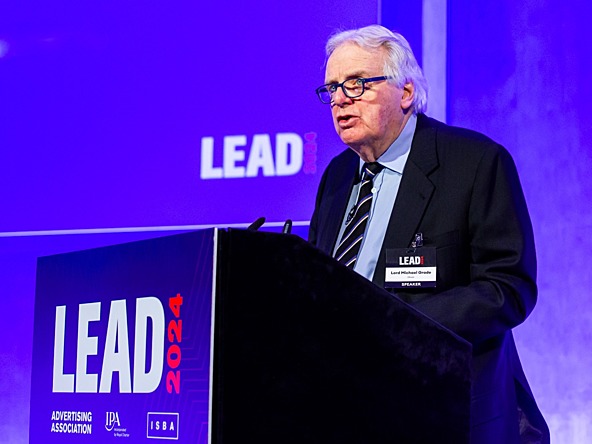Brands must protect their reputations from online harm, says Lord Grade

(Pictured: Lord Grade at LEAD – credit to Bronac McNeill)
Grade told the LEAD, which was organised by the Advertising Association, Isba and the Institute of Practitioners in Advertising, that the Online Safety Act, which came into law late last year, would place greater onus on platforms to tackle harmful content.
He said the potential for loss of advertising revenue, fines and regulatory action and a moral and reputational need to tackle damaging content online would lead social media platforms and search engines based overseas to comply with the law.
“Social media and search platforms themselves must take steps to protect their users,” Grade added. “Children are always the top priority – we will ensure that tech firms are addressing child sexual abuse, suicide and self-harm material.”
Grade also warned companies to put pressure on platforms to address issues with the content they allow to avoid potential damage to brands if their advertising is run alongside harmful material.
“Online safety is happening now,” added Grade. “You have a chance to play your part by getting ahead of the harm. For brands and agencies, this is about making trust and safety a priority.
“Most of all, it is about making sure that platforms you are spending money on are aware of their new duties under the Online Safety Act. Are you sure and can you be sure that your ad spend isn’t damaging your valuable brand by being algorithmed alongside harmful, horrible content? How good is your campaign monitoring? Many of you are asking these questions already, and are demanding answers, and if you’re not, now is the time.
“Here is the chance to get ahead of the harm and inoculate your brands against the potential of online harm by association.”
Stephen Woodford, chief executive at the Advertising Association, said in response to Grade’s speech: “We welcome Lord Grade’s constructive speech about Ofcom’s new duties under the Online Safety Act and note his call to the advertising industry to focus on responsible growth, keeping ahead of potential harms and fraud and making trust and safety its top priority.
“We are already in a position of strength: the ASA is a world-class regulator and its pro-active AI-driven regulation is expanding rapidly. ”
Government and opposition
Also speaking at the conference, Lucy Frazer MP, secretary of state for culture, media and sport, outlined the importance of developing the creative industries for economic success.
“I recognise and the government recognises what your industry does for our economy,” she said.
“Our creative industries are growing at twice the rate as the rest of the economy, and last year accounted for £126bn. Advertising is a massive part of that success story – it accounts for around 15% of the creative industry’s output, and all indicators suggest it will continue to grow in size.”
Frazer added that “if we want our advertising industry to thrive in the future, we need the right skills for the right jobs”, and said a cultural education plan would give children better connections to culture and the arts at school.
Apprenticeships could also be made more flexible to help industries such as advertising, Frazer said, as well as better communicating the creative careers programme.
Frazer said that content creators needed to have “control and transparency” over how their work was used by artificial intelligence (AI) models
LEAD also heard from Sir Chris Bryant, shadow minister for the creative industries and digital, who said that the creative sector would not be ignored by a Labour government, noting it had grown 1.5 times faster than the rest of the economy.
“And yet nearly all political debate in this country is about all the other industries other than the creative industries,” Bryant added.
“That’s why the creative industries, I can assure you, will be at the heart of Labour’s key mission – to grow the British economy faster than any other economy in the G7. Yes, that’s ambitious and yes, we can only do that if we grow the creative industries at least at the pace they have been growing in the past few years, and I would argue much faster.”
He also called for proper recognition for the benefits of a creative education or degree: “We need to get it into our heads in this country that these industries are just as important and these jobs are the jobs of the future – they are our future prosperity.”
Labour would seek apprenticeship levy reform, Bryant said, focusing on flexibility, portability and the ability for the levy to work across different countries.

We hope you enjoyed this article.
Research Live is published by MRS.
The Market Research Society (MRS) exists to promote and protect the research sector, showcasing how research delivers impact for businesses and government.
Members of MRS enjoy many benefits including tailoured policy guidance, discounts on training and conferences, and access to member-only content.
For example, there's an archive of winning case studies from over a decade of MRS Awards.
Find out more about the benefits of joining MRS here.














0 Comments